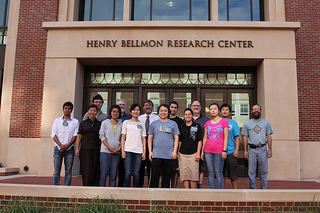OSU offers first infrared structural biology workshop
Friday, August 16, 2013

Infrared structural biology is a powerful emerging technology that enables unique
and sensitive detections of dynamic structural motions in proteins. It allows scientists
to "see" proteins in action. This technology has multiple advantages over other structural
biology techniques, namely its high structural sensitivity, outstanding time sensitivity
(1 picosecond or 1 millionth of millionth of a second), and wide time window (from
1 picosecond to kiloseconds). Many areas of protein research can benefit from this
emerging technology, including the understanding and treatment of many diseases that
are caused by protein malfunction, understanding and application of electron transfer
and proton transfer in molecular bioenergy, as well as fundamental understanding of
life at molecular levels.
The main goal of this workshop was to provide education and training to graduate students
and postdoctoral researchers in infrared structural biology and to develop OSU as
a leader in applications of infrared structural biology to enhance broad areas of
protein science research. Seven doctoral students and one postdoctoral researcher
from three graduate programs participated in this workshop.
This workshop was jointly sponsored by the OSU Infrared Structural Biology Initiative
Program, which is led by OSU physicist Dr. Aihua Xie, the OSU Interdisciplinary Creative
Planning Program, which is managed by the Provost’s office, and OSU Department of
Physics.
Dr. Xie, a professor of physics and Fellow of American Physical Society, was the organizer
and the main instructor of the workshop. She said, “I was grateful for the many supporters
of the workshop, particularly to Mr. Zhouyang Kang, a senior PhD student in physics,
for his hard work and skillful instruction in hands-on FTIR spectroscopic studies
of biomolecules and computer-assisted studies of molecular vibrations. I am also
grateful to Ms. Christine Nichols, outreach coordinator from OSU College of Arts and
Sciences, for her professional, friendly, timely and tireless support in handling
all administrative aspects of the workshop, and to OSU Interdisciplinary Creative
Planning Program for financial support.”
